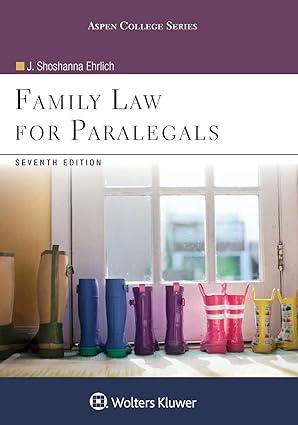At issue in this appeal is the validity of a prenuptial agreement executed between the appellant, Catherine
Question:
At issue in this appeal is the validity of a prenuptial agreement executed between the appellant, Catherine E. Walsh Simeone, and the appellee, Frederick A. Simeone. At the time of their marriage, in 1975, appellant was a twenty-three year old nurse and appellee was a thirty-nine year old neurosurgeon. Appellee had an income of approximately \(\$ 90,000\) per year, and appellant was unemployed. Appellee also had assets worth approximately \(\$ 300,000\). On the eve of the parties' wedding, appellee's attorney presented appellant with a prenuptial agreement to be signed. Appellant, without the benefit of counsel, signed the agreement. Appellee's attorney had not advised appellant regarding any legal rights that the agreement surrendered. The parties are in disagreement as to whether appellant knew in advance of that date that such an agreement would be presented for signature. Appellant denies having had such knowledge and claims to have signed under adverse circumstances, which, she contends, provide a basis for declaring it void. The agreement limited appellant to support payments of \(\$ 200\) per week in the event of separation or divorce, subject to a maximum total payment of \(\$ 25,000\). The parties separated in 1982 , and, in 1984 , divorce proceedings were commenced. Between 1982 and 1984 appellee made payments which satisfied the \(\$ 25,000\) limit. In 1985 , appellant filed a claim for alimony pendente lite. A master's report upheld the validity of the prenuptial agreement and denied this claim. We granted allowance of appeal because uncertainty was expressed by the Superior Court regarding the meaning of our plurality decision in Estate of Geyer, 516 Pa. 492, 533 A.2d 423 (1987) (Opinion Announcing Judgment of the Court). The Superior Court viewed Geyer as permitting a prenuptial agreement to be upheld if it either made a reasonable provision for the spouse or was entered after a full and fair disclosure of the general financial positions of the parties and the statutory rights being relinquished. Appellant contends that this interpretation of Geyer is in error insofar as it requires disclosure of statutory rights only in cases where there has not been made a reasonable provision for the spouse. There is no longer validity in the implicit presumption that supplied the basis for Geyer and similar earlier decisions. Such decisions rested upon a belief that spouses are of unequal status and that women are not knowledgeable enough to understand the nature of contracts that they enter. Society has advanced, however, to the point where women are no longer regarded as the "weaker" party in marriage, or in society generally. Indeed, the stereotype that women serve as homemakers while men work as breadwinners is no longer viable. Quite often today both spouses are income earners. Nor is there viability in the presumption that women are uninformed, uneducated, and readily subjected to unfair advantage in marital agreements. Indeed, women nowadays quite often have substantial education, financial awareness, income, and assets.....
Questions:
1. According to the lower court's reading of the precedent case of Estate of Geyer, when will a premarital agreement be upheld?
2. What does the Pennsylvania Supreme Court see as the underlying presumption of the Geyer decision?3. Why does the court think this presumption is no longer valid?
4. How does this lead the court to rethink the rules regarding the enforceability of prenuptial agreements?
5. According to the decision, will a party's lack of understanding of the terms of a premarital agreement invalidate the agreement? What about a party's failure to consult with legal counsel? Why does the court take the position that it does?
6. What position does the court take regarding the reasonableness of the agreement at the time of execution? At the time of enforcement? Explain the court's position.
7. What is the court's position with respect to whether full and fair disclosure is required?
8. What position does the dissent take with respect to considerations of reasonableness at the time of execution? At the time of enforcement? Why does the dissent reject the majority approach?
Step by Step Answer:






